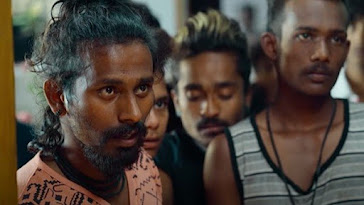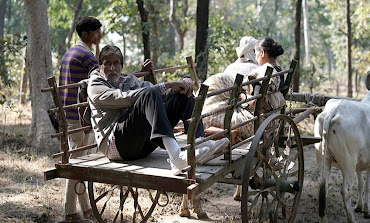Jhund movie review rating: Three stars out of five
First things first, it was lovely to watch Jhund in the theatres after nearly two years of pandemic-induced closure. The whistling, cheering, clapping throughout by the spirited, reactive audience is the big screen experience I relish.
Based on true events, noted Marathi director Nagraj Manjule’s (Fandry, Sairat) Hindi debut Jhund (Herd) is a largely pulsating narrative.
There is a simple scene midway Jhund that defines Manjule’s voice as a filmmaker. A football player, a boy from the slums is overwhelmed that anyone wants to hear him out at all. Just that another person will sit down and patiently hear him out stuns him to surprise.
Jhund story
Jhund features the other India, people we choose to overlook, sweepers, rag pickers, domestic servants, street vendors, cobblers, knife sharpers… A slum dweller in Jhund is overwhelmed that his mere presence is acknowledged by the world.
Sports teacher Vijay Borade (Amitabh Bachchan) uses his own time, money, limited resources, attempting to divert the lives of crime-infested, drug-addicted talented slum children (Ankush Gedam, Angel Anthony, Karthik Uikey, Sayli Patil, and others) to football.
This could have been the cliched underdog story, with the inevitable football final victory against the odds climax, but Manjule takes on a larger canvas, tells larger truths.
The downtrodden youth and the slang, sounds, life, sweat, rhythm, smoke, drink, fight, food, and congested lives of the littered, narrow-laned Indian slums are brought home, thanks to an incredible young cast and their dust earthy performances.
That Lagaan-like feel
The camera angles on a chain-snatching, cell phone stealing, and whitener-sniffing gang, build the tempo.
The climatic chunk of Jhund is the first half football match between the school team and the slum team, this monumental game bounces off the screen with Ashutosh Gowariker’s Lagaan (2001) like energy, detailing, and humour. The audience cheered the loudest here, thanks to some deft football game choreography.
As in the Sairat theatrical cut, the interval arrives at two hours running time, followed by the final hour, an editing decision that fits proceedings.
Ajay-Atul’s soundtrack, Sudhakar Reddy Yakkanti’s flexible cinematography, Saket Kanetkar’s background score power Jhund’s big-screen impact.
Missed shots at goal
Not all side plots hit the target. The daunting journey to get a passport made is effective but could have been another movie, the suicide attempting goalkeeper has a too-rapid turn of events.
The unhappy son suddenly waking up to his father’s dreams is hurried conflict-resolution. Jhund could easily have been a 30-minutes briefer, sharper, far superior drama.
Despite an underplayed, fine performance Amitabh Bachchan as the coach sticks out larger than life, because of his undeniable hero-laden screen projection. That court monologue situation services Bachchan’s star power, not his character, and stalls. Manjule doesn’t fully manage to fit Bachchan’s Vijay Borade into a brick-hard real world.
Walls, limits, barb wire
The drone shots of how two football grounds and a wall divide India’s wealthy and poor. Walls, gates, boundaries lurk as symbolic hurdles. The final wall shot, warning text, and an airplane whooshing past high above, unstoppable. End credits. More telling than a line of dialogue.
Unexpected turns
How seemingly ordinary events are made out to be epic highlights of a slum kid’s journey features Jhund‘s greatest surprises. The heartening airport security check sequence, how a young man is tortured by the past is a screenplay writing gold moment.
Jhund movie review
Much more than a sports drama, Jhund steers away from the obvious, hits the road running, largely compelling in bringing out India’s pertinent caste, class divide issues, if not as sharply as Sairat. It is still contemporary, hard-hitting, if stretched cinema, but undeniably cinema.
Jhund is best watched on the big screen.



